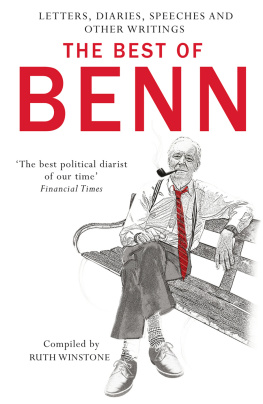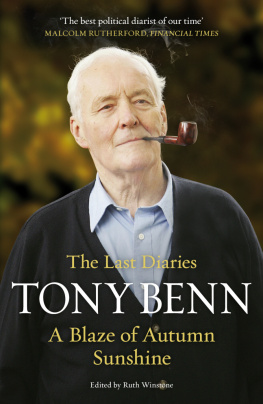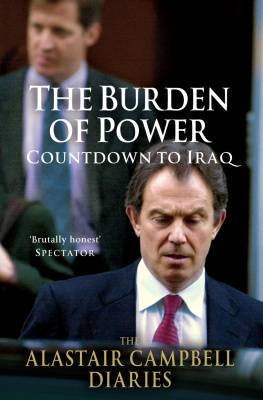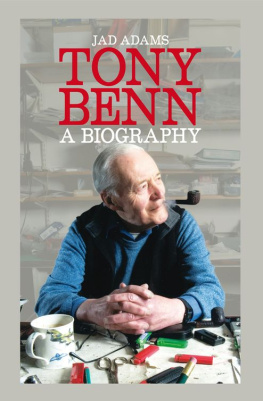Contents
About the Author
Tony Benn has been the Labour Member of Parliament for Chesterfield since March 1984, and was MP for Bristol South East from 1950 to 1983. He was elected to the National Executive Committee of the Labour Party in 1959, and was Chairman of the Party in 1971/72. He has been a Cabinet Minister in every Labour Government since 1964, holding the positions of Postmaster General, Minister of Technology, Minister of Power, Secretary of State for Energy, and one-time President for the Council of Energy Ministers of the European Community. He contested the leadership of the Labour Party in 1976 and 1988.
He is the author of thirteen previous books, including Arguments for Democracy and Fighting Back. He is married to Caroline, and they have four children and seven grandchildren.
Also by Tony Benn
THE REGENERATION OF BRITAIN
SPEECHES
ARGUMENTS FOR SOCIALISM
ARGUMENTS FOR DEMOCRACY
PARLIAMENT, PEOPLE AND POWER
THE SIZEWELL SYNDROME
FIGHTING BACK: SPEAKING OUT FOR SOCIALISM IN THE EIGHTIES
OUT OF THE WILDERNESS: Diaries 19631967
OFFICE WITHOUT POWER: Diaries 19681972
AGAINST THE TIDE: Diaries 19731976
CONFLICTS OF INTEREST: Diaries 19771980
The End of an Era
Diaries 198090
Tony Benn
Edited by Ruth Winstone

This book is dedicated with love to our grandchildren: Michael, James, William, Jonathan, Caroline, Emily and Daniel.
Acknowledgements
The immense task of researching, editing and preparing this book for publication has been undertaken by Ruth Winstone, the editor for all five volumes of the Diaries: without her political understanding, combined with formidable research skills, this series could not have been published.
Kate Mosse, former Editorial Director at Random House, has overseen the publication of all five volumes and has given unfailing encouragement from the outset. Her shrewd judgement and editorial wisdom have been exercised at every stage.
My grateful thanks also to Linden Stafford, whose meticulous attention to style and detail has been invaluable.
Sheila Hubacher has transcribed from tape more of the Diaries than any other person, with good humour, constructive criticism and sometimes exasperation throughout. I also had constant help and courtesy from Karen Holden and Neil Bradford of Hutchinson.
I would like finally to thank all those at Random House who have supported the Diaries project from first to last, in particular the Publicity Director, Bridget Sleddon, whose enthusiasm and commitment to the project have been much appreciated.
Illustration Acknowledgements
Hutchinson would like to thank the following for their kind permission to use various illustrations in this volume:
PHOTOGRAPHS
Popperfoto; Universal Pictorial Press; Times Newspapers; Independent; Chris Mullin; John Harris; Benn Archives.
CARTOONS
Nicholas Garland Daily Telegraph plc ().
Whilst every effort has been made to clear copyright, in some cases this has not been possible. The publishers would like to apologise in advance for any inconvenience this might cause.
Editors Note
When I agreed to undertake the task of editing the Benn diaries for publication my overriding concern was that the balance and integrity of the original typescript were preserved and that the Hansard rules of editing were followed. This volume, encompassing as it does a full decade of political life, has presented a greater challenge than any of the previous volumes which covered the years 196380.
The original transcript for 198090 is three and a half million words long; to reduce it to 325,000 words for publication has meant that the requirement of continuity has been exceptionally difficult to meet. Some areas of political activity and individual episodes regrettably have ended up on the cutting room floor. For example, the Labour Partys obsession with internal disciplinary matters, though described fully, has not been accorded the proportion it occupied in the original diaries; many of the proceedings against individuals have had to be omitted altogether.
The End of an Era also inevitably deals in greater detail with the early Eighties, when changes to the Labour Partys structure and leadership were crucial in the Partys history. The latter half of the book is more diverse in nature, reflecting Tony Benns interests outside the confines of Party and Parliament.
I have added detailed chapter notes and linking passages where, in my view, amplification has been required; but this is not a history text book and some other contemporary references which we take for granted may for future readers require some explanation.
Throughout I have tried to interweave the serious, the significant, the light-hearted and even the trivial to give the flavour of the full work. These have been my own editorial judgements, for which I take full responsibility: the uncut diaries are available to those wishing to study the complete text in depth.
Ruth Winstone
July 1992
Foreword
The years covered by this volume of my diaries were marked by enormous political changes both here and abroad, and we are still much too close to those events to be able to assess their full significance.
Certainly the Eighties saw a major swing to the right in all industrial countries; the crumbling of the communist regimes; the first falterings in the boom years in the capitalist west; the consolidation of the European Community into a tighter bloc; the slow collapse of apartheid; and many other events of comparable importance.
Throughout this decade my diaries are necessarily concerned mainly with political life in Britain, dominated as it was by the Conservatives, a decade ending with the abrupt overthrow of Margaret Thatcher and with the Labour leadership believing that the Party was poised for an imminent triumphant victory.
Neil Kinnock, elected Leader in 1983, had tried to transform the policies of the Party and to restructure its organisation; and in doing so, he enjoyed the support of the overwhelming majority of the Shadow Cabinet, the National Executive and the trade union leaders. This plan was endorsed by the political commentators, in the hope that it would eliminate socialism as a force in British politics and they set out to persuade the Party that it was the only way to make it electable. The Party leadership carefully distanced itself from many of the important grassroots campaigns that were mounted against Government policy, especially the campaign by the miners against pit closures, the campaign by the print unions against unfair dismissal and the hugely successful campaign against the Poll Tax which led to its repeal. The Policy Reviews were used to secure the abandonment of unilateralism and to commit Labour to retain nuclear weapons and high levels of defence expenditure; to adopt a bi-partisan policy on Northern Ireland; to embrace a fully federal European union; to give up Labours opposition to many of the Conservatives anti-trade union laws; and to offer full support to the Americans in the horrific Gulf War. The NEC also embarked upon an internal disciplinary programme, expelling a number of good socialists and imposing election candidates on constituencies and suspending local parties that took an independent view.
From 1980 to 1982 the left in the Party had campaigned for democractic constitutional reforms to make the leadership more accountable to the membership; but after 1983 power in the party became more and more centralised, a process which downgraded the role of both the Party Conference and the NEC and led to the introduction of new rules, after the 1988 leadership election challenge, designed to exclude left-wing MPs from being nominated for the leadership in the future. The Party gave up any genuine political education and analysis; concentrated its attacks on individual Conservative ministers; reduced public expectations by narrowing the vision of the Party to the single, simple objective of installing Labour ministers in office; and adopted high-powered American advertising techniques to secure victory.
Next page











